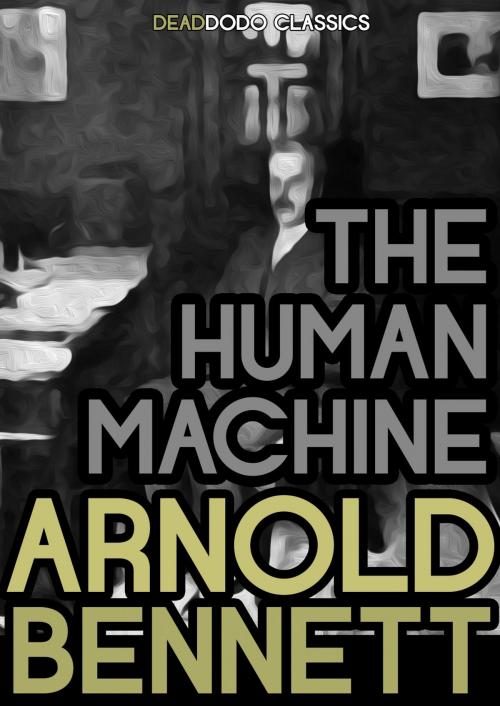| Author: | Arnold Bennett | ISBN: | 9781508026051 |
| Publisher: | Dead Dodo Presents Arnold Bennett | Publication: | September 5, 2015 |
| Imprint: | Dead Dodo Presents Arnold Bennett | Language: | English |
| Author: | Arnold Bennett |
| ISBN: | 9781508026051 |
| Publisher: | Dead Dodo Presents Arnold Bennett |
| Publication: | September 5, 2015 |
| Imprint: | Dead Dodo Presents Arnold Bennett |
| Language: | English |
Dodo Collections brings you another classic from Arnold Bennett, ‘The Human Machine’.
This is a typical example of the sort of self-improvement essays or book that Arnold Bennett produced so readily during his heyday. In Britain in the first decades of the 20th century, there was a demand for anything that would help ordinary people better themselves, and Bennett obliged with volumes on Mental Efficiency, how to live 24 hours a day, how to improve one's literary taste, as well as books on the life of a novelist, etc.
Bennett (1867-1931) was a British novelist. He was born in a modest house in Hanley in the Potteries district of Staffordshire. At age 21 he went to London as a solicitor's clerk. He won a literary competition in Tit Bits magazine in 1889 and was encouraged to take up journalism full time. From 1900 he devoted himself full time to writing, giving up the editorship and writing much serious criticism, and also theatre journalism, one of his special interests. In 1902 Anna of the Five Towns, the first of a succession of stories which detailed life in the Potteries appeared. In 1908 The Old Wives' Tale was published, and was an immediate success throughout the English-speaking world. His most famous works are the Clayhanger (1910) trilogy and The Old Wives' Tale. These books draw on his experience of life in the Potteries, as did most of his best work. Among his other books are: The Grand Babylon Hotel (1902), The Grim Smile of the Five Towns (1907), Hilda Lessways (1911), The Author's Craft (1914), The Lion's Share (1916), and The Roll-Call (1919).
Dodo Collections brings you another classic from Arnold Bennett, ‘The Human Machine’.
This is a typical example of the sort of self-improvement essays or book that Arnold Bennett produced so readily during his heyday. In Britain in the first decades of the 20th century, there was a demand for anything that would help ordinary people better themselves, and Bennett obliged with volumes on Mental Efficiency, how to live 24 hours a day, how to improve one's literary taste, as well as books on the life of a novelist, etc.
Bennett (1867-1931) was a British novelist. He was born in a modest house in Hanley in the Potteries district of Staffordshire. At age 21 he went to London as a solicitor's clerk. He won a literary competition in Tit Bits magazine in 1889 and was encouraged to take up journalism full time. From 1900 he devoted himself full time to writing, giving up the editorship and writing much serious criticism, and also theatre journalism, one of his special interests. In 1902 Anna of the Five Towns, the first of a succession of stories which detailed life in the Potteries appeared. In 1908 The Old Wives' Tale was published, and was an immediate success throughout the English-speaking world. His most famous works are the Clayhanger (1910) trilogy and The Old Wives' Tale. These books draw on his experience of life in the Potteries, as did most of his best work. Among his other books are: The Grand Babylon Hotel (1902), The Grim Smile of the Five Towns (1907), Hilda Lessways (1911), The Author's Craft (1914), The Lion's Share (1916), and The Roll-Call (1919).















